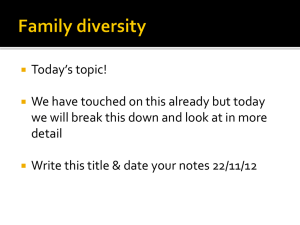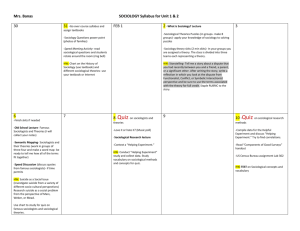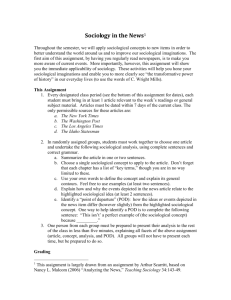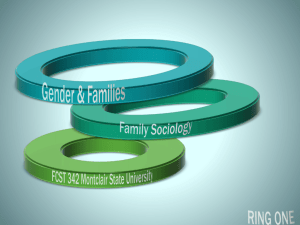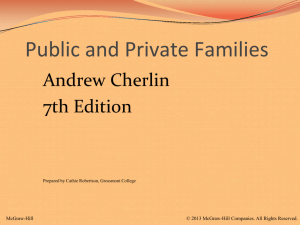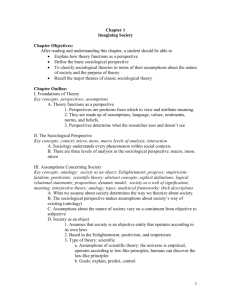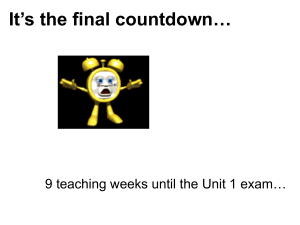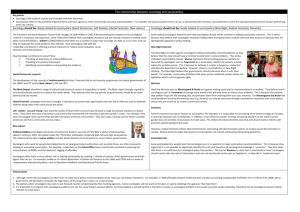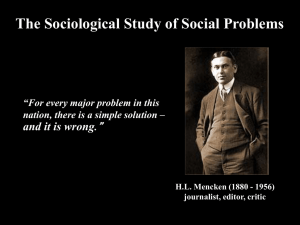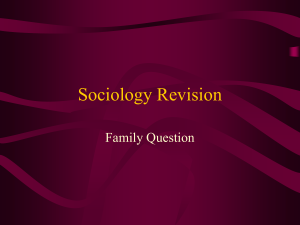AS Sociology
advertisement
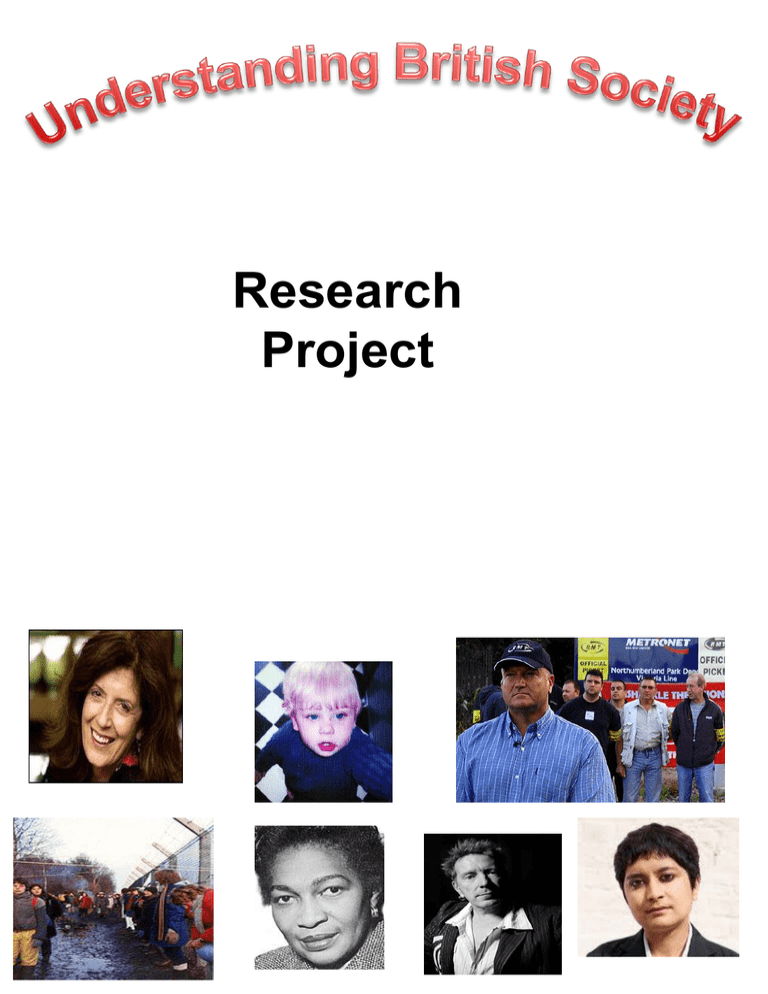
Research Project Your task is to develop an understanding of the nature of British society through researching the life stories of two people who, in the last century, have changed some part of British society. Having researched the life stories of two people you will then use sociological concepts to analyse what the lives of these two people tell us about British society. The purpose of this task is to evaluate the usefulness of the sociological concepts and perspectives we will use throughout the Sociology course. The police force Consumerism Homosexuality Masculinity Religion Child welfare Women’s rights Political protest Domestic violence Festival culture Youth culture The legal system Aspects of society and the people you can use to illustrate them. 1. The police force and British society From Blair Peach 2. to Ian Tomlinson Consumerism and British society From Mary Quant to Anita Roddick 3. Homosexuality and British society From Alan Turing to Peter Tatchell 4. Youth culture and British society From John Lydon to Dizzie Rascal 5. Festivals and British society From Claudia Jones to Michael Eaves 6. Masculinity and British society From Vinnie Jones to Pete Andre 7. Religion and British society From Christina Rees to Zaki Badawi 8. Child welfare and British society From Neil Morrissey to Baby P 9. The legal system and British society From David Chaytor to Jordan Blackshaw 10. Women’s rights and British society From the Ford, Dagenham strikers to Caroline Lucas 11. Political protest and British society From Greenham Common Peace camp to Alan Lake and the EDF 12. Domestic violence and British society From Sherly Gascogne to to Kerry Katona 13. Corporations and British society From Richard Branson to Levi Roots 14. Trade unionism and British society From Arthur Scargill to Bob Crow 15. Social Justice and British society From Betty Williams to Shami Chakrabarti Notes Examines how society is based on shared experiences which act like a ‘social glue’. 1. Functionalism Contrasting Viewpoints 2. Marxism Examines how society is shaped by class inequalities and class conflict. Examines how women are disadvantaged by men’s dominance of the economy, culture and politics. 3. Feminism Contrasting Viewpoints 4. Postmodernism Examines how individuals are faced with choices and risks when deciding on how to shape their own identity. Twelve concepts 1. Social solidarity A sense of togetherness; whereby members of society share similar values and expectations about social life. 2. Value consensus A general agreement about what are the things of worth in society. 3. Interdependence A state of balance between parts of the social system. A change in one institution will lead to changes elsewhere. 4. Meritocracy Society rewards individuals who have talent and who work hard to develop that talent. 5. Ruling Class The group who have a powerful influence over the rest of society. Also known as the aristocracy or bourgeoisie. 6. Class conflict Beneath the surface of society there is an ongoing struggle between two groups because of opposing interests. 7. Exploitation Achieved by forcing the working class to work beyond what is necessary for survival and then taking the excess profit from them. 8. Ideology A set of beliefs which serve the interests of the dominant group in society. Media and schools disseminate these beliefs as right and natural. 9. Patriarchy Feminist sociologists claim that society is built on male domination and that men benefit from the exploitation of women 10. Dark side of the family Evidence shows that the lives of many families are scarred by domestic violence, child abuse and poverty. All too often this is hidden from public view. 11. ‘Pick and mix’ identity Postmodern sociologists argue that individuals have limitless choice over how to shape their identity 12. Risk and uncertainty Postmodern sociologists argue that the loss of traditional values creates anxiety and leaves the individual with a sense of rootlessness. Notes In A level Sociology there are certain themes that we will look at again and again. One theme is; 1. Social Conflict Many sociologists argue that opportunities to participate in society are not equally shared. Vast differences in wealth shape, for better or for worse, fundamental aspects of peoples lives in Britain today – from which school you attend, the job you have and even how long you live. This viewpoint sees society shaped by social conflict. A second theme is; 2. Social consensus On the other hand, many other sociologists argue that there is a ‘social glue’ which holds society together. Families, schools and religion all work together to promote a general agreement about the things of worth in Britain today – values such as tolerance, equality, freedom and cooperation. This viewpoint sees society shaped by social consensus. Your presentation to the class must include the following four headings; Life Stories Your introduction should include a basic biography of the two people. Aspect of British Society Provide a context so the audience understands the role your chosen ‘institution’ plays in British society. Sociological Concepts You will need to identify and define two or three relevant concepts that help you make sense of your life stories. The nature of British society Having researched the life stories you will then need to come to a conclusion about what these two people tell us about British society – is it based on social conflict or social cohesion or do we live in a ‘pick n mix’ culture? Step 1 Select your life stories They are: __________________________________ __________________________________ Step 2 Focus on one aspect of British society This is: _______________________________ Step 3 Identify two or three relevant sociological concepts that will help you explain what the life stories tell us about British society. They are: ________________________________________ ________________________________________ Step 4 Pick a broader theme that you think your life stories will illustrate. The broader theme is: _____________________________ Life Stories Stephen Lawrence Bobby Sands Died in prison in Northern Ireland following a hunger strike. He was a member of the IRA. This young black youth was murdered whilst waiting for a bus by a white gang. The police investigation into his murder was so poorly organised and given so little priority that the police were labelled ‘institutionally racist’. Aspect of British Society - Social Injustice 1,817 deaths in police custody in the last 10 years. In five of these cases there has been a conviction of a police officer. No office has served a prison sentence Sociological Concepts Conflict – in Britain there is long history of struggle for basic human rights. Ideology – the mass media often ignore and even misreport the problems faced by many communities across British society. The nature of British society The life stories of these two people suggest that British society is .... based on social conflict rather than social cohesion. In both cases the individuals experienced oppression and injustice and paid the price of inequality with their lives. Bobby Sands felt that the Catholic community in Northern Ireland was being denied basic human rights of equality, respect and dignity. Stephen Lawrence was denied justice because the police officers leading the investigation saw him as ‘just another dead black kid’. In conclusion it can be argued that .... the Marxist view of society as being based on inequality and exploitation is more valid and useful ... than the functionalist view of society as being based on a sense of togetherness and shared values.
